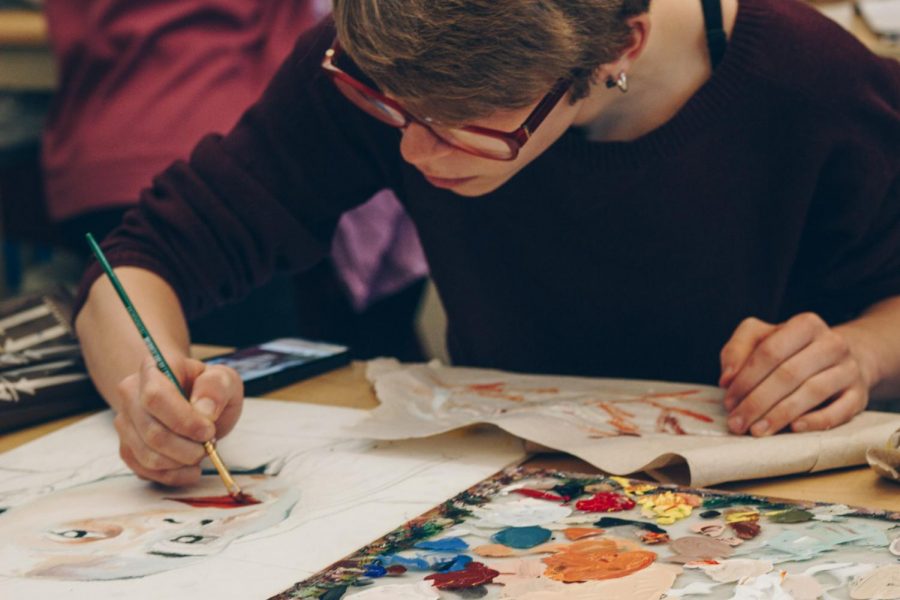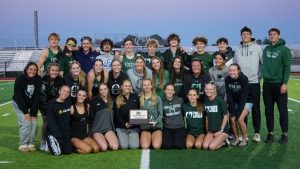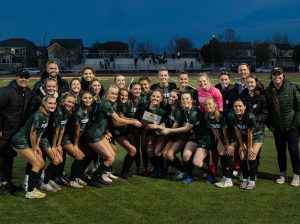Why the Arts Matter
(Photo credit: Kaitlyn Philavanh) Lauren Thurgood concentrates on her oil painting in AP Studio Art.
February 4, 2018
The arts have and always will hold a place of importance in humanity’s worth. The defining elements of the ages have been most accurately depicted in art forms; as humanity evolves, so does our self expression. From the time our prehistoric ancestors depicted tales upon walls of rock, to the rock music of the 1980s and 1990s, man has found solace in the wonder of the art he creates.
Today, young adults have access to a whole universe of art, available to them with the push of a few buttons. Social media’s association and incorporation with various creative mediums has a very large influence on young minds and outlooks. The internet and use of social media has allowed both artist and consumer alike to push new boundaries when it comes to creating in innovative ways. The traditional art experience is making room for a more modern wave of art with the power in the hands of the youth to change the world of art as we know it. Despite this, degrees and careers in the arts continue to be widely discouraged, especially for artistic teenagers moving towards their own futures.
We live in a time when robots and products of artificial intelligence are taking over many technical and analytical job fields. However, there is no way to program individuality and creativity into a machine, and thus the arts have a possibility to gain a new respect. The inspiration and need for art and imaginative creation will always exist, whether we accept it as an acceptable career choice or not. Talk to any art major, and they would tell you art is a part of almost everything that we consume as people living in an economic world.
The value of arts in schools is often looked past in the grand scheme of academia. In 2012, the National Center for Education Statistics determined that music departments are often the first programs to be cut when schools are short of crucial funding. Degrees in the arts, from music to design, are seldom guaranteed what is socially considered to be a “suitable income”, discouraging many students to develop passions in the arts to begin with. Emphasis in activities for many high schools across the nation are more likely than not placed on academics and sports, and as a result, a large sum of the district’s funding is prioritized in that direction. In our day and age, an analytical mind is prioritized over the abstract mind.
Despite discouragement that the arts face in regard to its place in the academic world, studies show that involvement in creative topics are quite valuable. Statistics report that students who study in the field of arts are four times more likely to be recognized for school achievement, evidence that subjects requiring a creative mind enhance academic performance. According to a 2005 report by the Rand Corporation, art creates a safe, expressive outlet for students who are searching for mental and emotional release, and also “connects them larger world, ultimately improving community cohesion.” The benefits aren’t limited to mere academic performance, they can also be beneficial to the psychological well-being of an academic institution. Studies incorporating the arts allow students to gain more confidence, relieve stress, and improve communication skills. Art allows students to seek understanding across cultures and various forms of communication, and adapt to the vast world that we live in today.
Within Fossil Ridge High School, the opportunities to become more involved and witness the creative expression of other students are infinite. There are musicals and plays open to the student body to view, artwork on display in the halls, a multiplicity of art and music classes to take, and endless numbers of talented students. However, it is essential to remember that art’s impact and importance stretches far beyond the art wing. It’s present during assemblies, school dances, and the notebooks in which we doodle during excessively long lectures; art is the glue that holds our school together. It is the incognito agent that exceeds the classroom and promises each and everyone of us that there is a world beyond high school.







